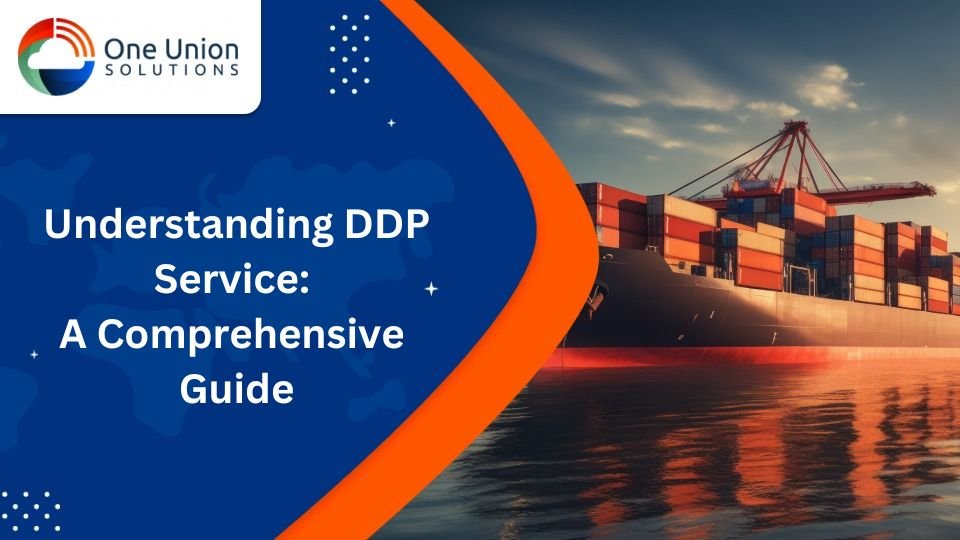In the world of international trade and logistics, smooth and efficient delivery is crucial to maintaining customer satisfaction and business success. One service that has gained immense popularity in simplifying global trade is Delivered Duty Paid (DDP). This comprehensive guide will explain what DDP service entails, its advantages, challenges, and how it compares to other shipping methods.
What Is DDP Service?
Delivered Duty Paid (DDP) is an international shipping term where the seller takes full responsibility for delivering goods to the buyer’s location. This includes handling shipping costs, export and import duties, taxes, and other related charges. Under the DDP agreement, the seller assumes all risks and costs associated with transporting the goods until they reach the buyer’s specified destination.
How Does DDP Service Work?
- Seller Preparation: The seller ensures the goods are properly packaged and labeled according to international shipping standards.
- Export Clearance: The seller manages all export documentation, pays the necessary export duties, and clears customs in the country of origin.
- Transportation: The seller arranges for transportation, which may include multiple modes such as air, sea, or road freight.
- Import Clearance: Upon arrival in the destination country, the seller handles customs clearance, including payment of import duties and taxes.
- Final Delivery: Once cleared, the goods are delivered to the buyer’s specified location, whether that’s a warehouse, business address, or another site.
Advantages of DDP Service
1. Convenience for Buyers
Buyers benefit significantly from DDP as it eliminates the complexities of customs clearance, import duties, and tax payments. They receive their goods hassle-free without needing to navigate the intricate processes involved in international trade.
2. Predictable Costs
Since the seller covers all expenses, buyers know the total cost upfront. This predictability is invaluable for budgeting and planning purposes.
3. Streamlined Process
DDP service ensures that the seller handles all logistics, making the entire process seamless and reducing the risk of delays caused by customs or incomplete documentation.
4. Enhanced Customer Satisfaction
By offering a comprehensive shipping solution, sellers can improve customer satisfaction and foster trust, as buyers receive their products without unexpected hurdles.
Challenges of DDP Service
While DDP offers numerous benefits, it also comes with certain challenges, particularly for sellers.
1. Increased Responsibility
Sellers take on significant responsibilities, including handling customs clearance and ensuring compliance with regulations in the destination country. This can be daunting, especially in regions with complex or opaque customs rules.
2. Higher Costs
Covering all duties, taxes, and shipping charges can be costly for the seller. These costs must be carefully calculated to avoid eroding profit margins.
3. Potential for Delays
Despite best efforts, delays can occur during customs clearance or transportation. Since the seller is responsible, they must manage these issues, which could affect delivery timelines.
4. Knowledge of Local Regulations
Sellers must stay informed about the import regulations and duties of the destination country. Non-compliance can lead to penalties, confiscated goods, or dissatisfied buyers.
Comparing DDP to Other Shipping Terms
DDP is often compared to other shipping terms such as Delivered at Place (DAP) and Free on Board (FOB). Understanding the differences helps businesses choose the best option for their needs.
Delivered at Place (DAP)
Under DAP, the seller is responsible for delivering goods to the buyer’s location, but the buyer handles import duties and taxes. While DAP reduces the seller’s financial burden, it shifts the responsibility of customs clearance to the buyer.
Free on Board (FOB)
With FOB, the seller’s responsibility ends once the goods are loaded onto the shipping vessel. The buyer assumes all risks and costs from that point onward, including freight, insurance, and import duties. FOB is less convenient for buyers but can be more cost-effective for sellers.
When to Use DDP Service
High-Value Goods
For expensive items, DDP ensures a smooth transaction and eliminates risks associated with customs clearance and taxes for the buyer.
Customer-Centric Business Models
Businesses prioritizing customer satisfaction, such as e-commerce platforms, often prefer DDP to provide a hassle-free experience for buyers.
Entering New Markets
Sellers expanding into unfamiliar markets can use DDP to attract buyers who may lack experience in handling customs processes.
Best Practices for DDP Service
To succeed with DDP, sellers must adopt certain best practices:
- Partner with Reliable Logistics Providers Working with experienced freight forwarders or third-party logistics providers can simplify the process and ensure compliance with regulations.
- Understand Destination Country Regulations Research import duties, taxes, and compliance requirements for the buyer’s location to avoid unexpected costs or delays.
- Transparent Communication Clearly communicate the terms of delivery and any potential risks with buyers to manage expectations.
- Factor Costs into Pricing Include all potential DDP-related expenses in your pricing strategy to protect profit margins.
- Leverage Technology Use shipping management software to streamline documentation, track shipments, and ensure accurate cost calculations.
Conclusion
Delivered Duty Paid (DDP) is a powerful shipping option that simplifies international trade by shifting all responsibilities to the seller. While it offers convenience and predictability for buyers, sellers must navigate increased responsibilities, costs, and potential challenges. By understanding the intricacies of DDP and adopting best practices, businesses can use this service to enhance customer satisfaction, expand their global reach, and build a competitive edge in international markets. Whether you’re a buyer seeking a hassle-free shipping experience or a seller looking to attract new customers, DDP remains a valuable tool in the logistics toolkit.














































